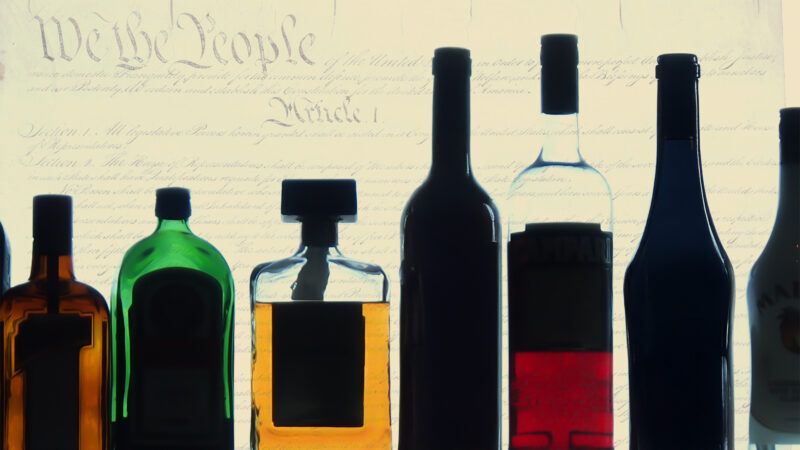How Protectionist Wine and Liquor Laws Violate the Constitution
The Commerce Clause protects free trade between the states.

The U.S. Supreme Court has struck down protectionist state wine and liquor laws on the grounds that they illegally discriminated against out-of-state wineries and out-of-state alcohol retailers. Yet earlier this week, a federal appellate court upheld an Indiana law that forbids out-of-state retailers from shipping wine directly to Indiana consumers.
What's going on?
You’re reading Injustice System from Damon Root and Reason. Get more of Damon’s commentary on constitutional law and American history.
The case is Chicago Wine Company v. Braun. At issue is a state law forbidding retailers that are not based in Indiana from shipping wine directly to Indiana consumers, either via services like FedEx or UPS, or via the retailer's own fleet of vehicles.
The constitutional question at the heart of the case revolves around an important yet lesser-known legal doctrine called the "Dormant Commerce Clause." This doctrine holds that the Constitution's Commerce Clause, in addition to authorizing Congress to regulate commerce between the states, also forbids the states themselves from erecting their own interstate economic barriers.
As James Madison explained in Federalist No. 42, one of the key purposes of the Commerce Clause was to eliminate the assorted tariffs, monopolies, and other interstate trade impediments passed by the states under the Articles of Confederation. "A very material object of this power," Madison wrote, "was the relief of the States which import and export through other states from the improper contributions levied on them."
The Supreme Court has invoked the Dormant Commerce Clause in several notably boozy cases. In Granholm v. Heald (2005), for example, the Court invalidated several state laws that banned the direct sale of wine to consumers by out-of-state wineries. "Time and again," observed the majority, "this Court has held that, in all but the narrowest circumstances, state laws violate the Commerce Clause if they mandate 'differential treatment of in-state and out-of-state economic interests that benefits the former and burdens the latter.'"
More recently, in Tennessee Wine & Spirits Retailers Association v. Thomas (2019), the Court overruled a state law that imposed a two-year state residency requirement on all applicants seeking a license to operate a liquor store. Because this measure "blatantly favors the State's residents and has little relationship to public health and safety," the majority held, "it is unconstitutional."
In its decision this week in Chicago Wine Company v. Braun, the U.S. Court of Appeals for the 7th Circuit did cite both Heald and Tennessee Wine. Yet the appellate court's judgment would seem to be at odds with the principles of interstate free trade embraced by those two precedents.
Adding to the confusion, the 7th Circuit judges who decided the case totally disagreed with each other about why the state law should be upheld in the first place. According to the concurring opinion of Judge Frank Easterbrook, for example, the Indiana statute deserved to win because, in Easterbrook's view, no unlawful impediment to interstate trade was evident.
By contrast, according to the concurring opinion of Judge Michael Scudder, "Indiana's differential treatment of in-state and out-of-state retailers with respect to wine self-deliveries is discriminatory." However, Scudder continued, such discrimination in interstate commerce was acceptable here because of "the State's legitimate, non-protectionist interests" in advancing governmental objectives, such as "promoting temperance."
So the 7th Circuit not only upheld a protectionist law whose existence seemed to be foreclosed by Supreme Court precedent, but the judges who upheld the law could not even agree on the reason why the law deserved to survive judicial review.
To be sure, the right of a Chicago wine shop to ship directly to consumers in a neighboring state may not sound like the most pressing legal dispute of the day. But the Constitution does protect the right to earn a living free from arbitrary and unnecessary government interference, and the Commerce Clause does forbid the states from erecting the very sort of interstate trade barriers at issue here.
When you mix alcohol with the Constitution, it is imperative to get the proportions right.


Show Comments (10)